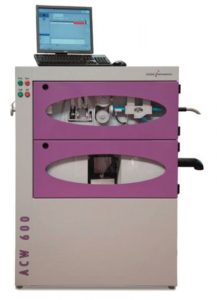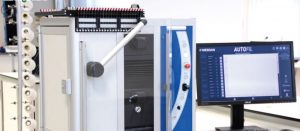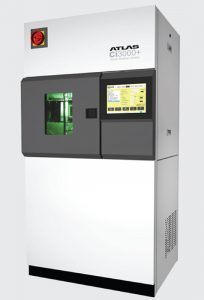
Part one in a two-part feature reviewing improved tests for fabric performance along with automated inspection and digitalization technologies that reduce product defects and waste to help improve the textile supply chain.
By Dr. Kavita Mathur
Key topics at ITMA 2023, held in Milan, Italy, included Automation and Digital Future, Advanced Materials, Sustainability and Circularity, and Innovative Technologies. These focus areas were very prominent throughout the show and were displayed in the ways of continuous improvement and advancements in technology, design capabilities and service for enhanced performance and overall efficiency. Machine manufacturers displayed diversified machines for apparel, home, carpet and technical textiles applications. To service these broad product portfolios, testing and qual-ity control (QC) equipment manufacturers offer advanced instruments in the field of measurement and control and automation, which support the textile industry in achieving efficient and reliable QC.
Textile testing and QC form a very important part of textile production, distribution and consumption. Quality management is important not only inside the factory, but also between suppliers because it helps to ensure the safety and quality for brands and consumers. Textile testing is used to check the quality and suitability of raw materials and aid in their selection, monitor production, assess the final product, investigate faulty material, and during product research and development. QC instruments, software and test methods have never been more important throughout the textile supply chain.
It is worth mentioning the increased number of digital solutions— many presented at the show — to help manage resource use and minimize waste, perform continuous online QC, and carry out automatic fault detection and predictive maintenance. The machinery and software presented at the show reduces the need for physical prototypes by way of virtual design software, simulation tools and digital replicas that facilitate testing and QC. Software solutions —either stand-alone or integrated into machinery — were more present at ITMA 2023 than in previous editions of the show. Machine learning and generative artificial intelligence (AI) may be the next frontier in testing and QC of textile materials.
The article covers the latest developments and advancements in testing and quality control technologies for fibers, yarns and fabrics presented by exhibitors at ITMA 2023 in five separate areas — fiber and yarn measurement, fabric performance testing, color measurement and communication, tactile measurement, and QC measurement.
Fiber And Yarn Measurement
Germany-based Textechno GmbH & Co. — represented in the United States by Greenville, S.C.-based Measured Solutions Inc. —presented its latest innovations at ITMA 2023, including several testing devices for fibers, yarns, nonwovens and fabrics. Two of these innovations are a new weak spot tester for spun yarns; and a modular testing system, which determines the quality parameters of recycled fibers, including fibers from post-industrial and post-consumer waste, regardless of their color, blending or chemical treatment.
The increasing importance of work safety as well as new demands for testing reinforcement fibers motivated Textechno to develop a new electronic wrap reel, the Texreel. It is applicable to textile yarns as well as technical yarns and reinforcement fibers used in composites such as car-bon fiber tows and glass fiber rovings. As part of the new ITMA chapter “Composites,” Textechno demonstrated the Fimatest testing system for fiber/matrix adhesion and for the characterization of roving and tow properties. The system consists of the Fimabond embedding station and a clamping accessory to the Favimat+. Information about the dynamics of the bonding process is provided through a new feature of the Fimatest, via contact angle measurements.
Additionally, the company exhibited the latest generation of its Favimat+ and Statimat DS testers. Favimat+ Airbot 2 is an automatic linear density and tensile tester for single fibers used to test various types of fibers, including high molecular weight polyethylene, glass, carbon and aramid, and is considered among the most important test devices with its structure combining six single-fiber test methods. For this device, since Textechno has already successfully entered the market of testing reinforcement fibers such as glass or carbon fiber, the company also presented an integrated measurement of fiber conductivity that is especially interesting in the field of smart textiles. Covafil+, designed by Textechno for filament yarns, was also on display. Compatible with MDTA 4, Covafil+ is identified as a reliable quality control system that can be adjusted to various applications, ensuring that all yarn parameters are tested at the same time.
Statimat DS, another innovation exhibited at Textechno’s stand, offers a new series of automatic tension tests, including tensile, shear, evenness and yarn count measurement, which are the most important four test methods of textile yarns and threads. Beside these machines, Textechno also introduced the MDTA 4, a micro-dust, trash and fiber-length tester, part of its Fibre Classifying System. The MDTA 4 works by processing raw cotton from the bale, providing data relating to impurities such as neps, trash, dust and fiber fragment content. The MDTA 4 can be used to determine the stickiness of raw cotton. For precise analysis of the number and size of impurities, it can also be combined with the NTDA module.

Another well-known manufacturer of textile testing equipment, Lenzing Instruments GmbH & Co. KG, Austria, provided a detailed insight into its comprehensive range of testing equipment for online, at-line and laboratory applications. In line with sustainability being a key theme for the textile industry at ITMA, these resource saving factors connected to QC with Lenzing Instruments also contribute to greener production processes. The company presented solutions for enhanced testing efficiency, reproducibility and accuracy, including the ACW 600/DVA, the DTI 600, the Rapid 600 and Sess. These systems enable yarn bobbins to be tested for linear density (dtex, denier) —using the ACW 600/DVA; for molecular orientation via the DTI 600, as well as for entanglement of flat and industrial yarn shortly after the last production step. Used together with the highly automated sampling system Sess, these ASTM standardized at-line testing instruments can decisively contribute to quick reactions to any detected quality issues. Additionally, intended for high-volume offline detection of filament yarn defects such as broken filaments and fluff, the company presented its Elkometer 200. Equipped with a customized number of Prompt Olo optical defect detection sensors, the system enables simultaneous defect inspection of up to eight yarn bobbins.
 Italy-based MESDAN S.p.A. offered a comprehensive range of testing equipment for physical analysis, dyeing, and finishing assessment. At ITMA, MESDAN displayed its solutions in the spinning hall on the VANDEWIELE stand and at the Thermetrics booth. Highlights from the company included a new mechatronic splicer for the Savio Proxima machine; two novel cotton fiber testing systems — the CONTEST-F2 for high volume cotton fiber testing and the CONTEST-S, a cotton stickiness tester; and the LAB SHREDDING MACHINE, a new laboratory scale equipment for textile mechanical recycling. The latest shredding machine complements its well-known Mini-Spinning line, extending Mesdan’s applications in one of the most important trends — textile recycling.
Italy-based MESDAN S.p.A. offered a comprehensive range of testing equipment for physical analysis, dyeing, and finishing assessment. At ITMA, MESDAN displayed its solutions in the spinning hall on the VANDEWIELE stand and at the Thermetrics booth. Highlights from the company included a new mechatronic splicer for the Savio Proxima machine; two novel cotton fiber testing systems — the CONTEST-F2 for high volume cotton fiber testing and the CONTEST-S, a cotton stickiness tester; and the LAB SHREDDING MACHINE, a new laboratory scale equipment for textile mechanical recycling. The latest shredding machine complements its well-known Mini-Spinning line, extending Mesdan’s applications in one of the most important trends — textile recycling.
Switzerland-based Uster Technologies AG introduced its latest product for fabric inspection. The company presented solutions based on automation and artificial intelligence, which are now integrated in its innovative fabric inspection technologies. The company attracted attention at the show for its new 360Q integrated solution suite, which combines instrumentation, software and support services for better decision making in the mill. The company has observed that many mills do not have enough personnel resources, and considering the fact that the number of textile graduates is insufficient, automation will simplify mills’ work. Uster’s 360Q presented a solution suite to enable the mill to be more successful, meaning it can make better-informed decisions that have a real impact on profits.
For fabric quality management, a component of the 360Q suite is the Uster Fabriq Assistant, a central platform for automated processing, analysis and visualization of quality data from Uster fabric inspection systems. The application is a Web-based tool with individual user accounts and specific dashboards. The Assistant eliminates manual data processing and speeds up decision processes significantly. Fabric manufacturers can release their product for delivery automatically based on their specific business rules without any humans in the loop, which eliminates bottlenecks and increases productivity. The application can also show a summary of quality performance from all the fabric rolls ever inspected in the mill. Information is presented as a variety of statistical analysis tools, with results in different charts, histograms or evolution trends. Fabriq Assistant uses advanced technologies such as AI. The AI attaches codes to each image generated by the Uster Fabriq Vision products, eliminating the need of mill personnel to spend time and effort, inserting codes to each defect in a computer to carry out a data review. Data classification — AI Classification — is fully automated with the use of AI, so producers can save more than 80 percent of the time taken when using manual methods.
The company also launched a new edition of Uster Statistics, a globally accepted quality benchmark for industry-wide quality improvement, which now includes a section for recycled yarn. The Uster Statistics 2023 edition features an extended range of fiber data, supporting sustainability goals. The challenge in this area is the spinning of recycled yarns. Uster Statistics aims to facilitate spinners transforming their mills to a more sustainable future, as spinning yarn blends of virgin and recycled fibers is a much bigger challenge than any other commonly used blend.
Italy-based Tomsic S.r.l., active in the production and marketing of complete laboratory equipment for spinning mills and autoleveller systems for cards and drawframes, showcased its new innovation — the Tomsic Nep & Trash Tester — designed to facilitate the control and tuning of fiber parameters in spinning mills. The company is trying to reduce electricity consumption in its products. The tester offers spinners control technology, simplicity of operation, flexibility and low maintenance costs, according to Tomsic. The company also presented its Evenness tester and the TensoTester3 strength tester, as well as other laboratory equipment for spinning mills.

Fabric Performance Testing
Among the companies with solutions to test fabric performance, Atlas Material Testing Technology, Mount Prospect, Ill. — a provider of accelerated lightfastness testing instruments and services for the textile industry — showcased its Ci3000+ Fade-Ometer® and Xenotest® 440 instruments. With Atlas weathering instruments, users can closely simulate real-world exposure to sunlight, temperature and moisture under accelerated conditions, allowing them to quickly and accurately predict product service life.
The Ci3000+ Fade-Ometer is widely considered the benchmark instrument for weathering and light-fastness testing of textiles. It has an advanced digital control system and optical technologies for reliable control of all test parameters, providing accurate prediction of textile products’ service life. The instrument features a large and intuitive graphical user interface, WXView. Also, for textile weathering tests, the Xenotest 440 is a compact, high-performance xenon-arc instrument with an ultrasonic humidifier to reduce water consumption, up to 4,000-hour lamp service life, and capable of simultaneous testing of more than 200 samples and meeting global lightfastness and weathering standards, including AATCC, ISO, Marks & Spencer and GB/T.
England-based SDC Enterprises (SDCE), with a newly designed logo and brand refresh, used ITMA 2023 in Milan to launch two new products — the PVC Sensor Film for testing BS EN ISO Standard 9185:2007 and the Reference 7 Wool Liquid Detergent, in line with the updated version of ISO Standard 6330:2021. These two products add to SDCE’s range of products for color fastness, lightfastness and physical testing for QC of textiles at international BS, EN and ISO Standards. The exhibit included Martindale consumables, detergents, grey scales, blue wools, and SDCE’s signature Multifiber for guaranteed consistency in the quality control of textiles.
In addition to its fiber testing equipment, Mesdan also presented three new yarn and fabric testing solutions: AUTOFIL, a high speed, fully automatic, 24-position yarn strength tester that can also test threads, hanks and fabrics in the semi-automatic mode; AUTODYN 3, a single-position, automatic version tensile strength tester for fibers, yarns, hanks and fabrics that incorporates an automatic yarn loading system; and BURSTMATIC, a pneumatic bursting tester to determine the bursting resistance of woven and knitted fabrics, nonwovens, and cardboard.
Rock Hill, S.C.-based SDL Atlas presented its extensive offering in consumables for QC. In addition to many core performance textiles testers, like the MMT moisture tester, DryRate 201 for the determination of dry rates, and FTT for skin touch property measurements, the company displayed next generation versions of its HydroPro, a hydrostatic head tester; AirPerm, an air permeability tester for paper, textiles and nonwovens; and Vortex Plus, a multiple-wash simulator machine.
England-based James Heal, a PPT Group brand centered in material testing, focused its presence at ITMA on innovations related to testing protective clothing and personal protective equipment. Continued development of textile testing equipment has been driven by global growth in more advanced protective wear, particularly for military and emergency services sectors. Initially launched at ITMA 2019, the company showcased developments in the James Heal Performance Testing Range line of instruments. Among them were the WickView, a tester for moisture wicking behavior in fabric; Aquabrasion, for analysis of effects of wet abrasion to better replicate real-life wear situations; and TruRain, a sustainable water repellency tester able to recycle water and cutting waste by 99 percent. In particular, WickView has moved ahead of the current test standard for moisture wicking behavior in fabric. James Heal is working with the industry to establish new standards in this area of textile testing after it developed its own test methods.
England-based Roaches International — a globally recognized manufacturer and supplier of laboratory dyeing, finishing equipment and textile performance testing instruments— introduced its IR Bonder, a vertical infrared bonding and chemical application line consisting of a single end bond applicator and infrared curing chamber with extremely low electrical consumption. The IR Bonder is integrated with a single head winder and, in addition to textile industry, has a potentially broad range of application markets including the automotive and medical sectors. Its drying mechanism simulates current coating technology and standard winding equipment to bond sewing threads by applying a nylon terpolymer, which is applied in a solution form. The system has a running speed of up to 600 meters per minute to process narrow width yarns or textiles on as many as six lanes.
GESTER International Co. Ltd., China, presented the GT-C13B-6 Martindale Abrasion Pilling Tester, offering precise evaluation of fabric pilling resistance, which is the standard method of determining the wear resistance of textiles or leather and the resistance to pilling. The company also displayed its GT-C02-1, a precisely calibrated tester to determine the tensile strength and elongation of fabrics. Also on display was equipment for waterproof test-ing of fabrics, hood fabric, tarpaulin, rainproof fabrics and geotextiles; the highly efficient GT-C26B hydrostatic pressure bursting tester; mask synthetic blood penetration tester, the GT-RA01, exclusively designed to test the blood penetration resistance of masks; the GT-C09 vertical tensile button tensing machine, which can perform even and vertical tensile test of all kinds of buttons on garments; and two circular sample cutters —the GT-C75 and GT-C75-3.
In the area of smart textile testing, China-based ChiuVention presented a number of instruments including its SmartTexLab smart lab management system, which is the first of its kind in the textile industry. This smart system efficiently digitally links multiple smart textile testing instruments and sample preparation equipment using multiple technologies like IoT automation, RFID, AI or vision detection. With this software, customers can easily control, obtain and share test results by installing the company’s SmartTexLab app on their cell phones. This is in line with the Sustainability and Circularity topic at ITMA, as textile labs can achieve automatic sample identification, automatic sample cutting, and automatic transmission of test results for the same sample and instrument, and then, after the test, a summary report can be quickly shared online to the quality control department or customer.
In addition to the SmartTexLab, and among the most popular of its nine instruments showcased, the company showed its SmartShrink Rate Tester. The machine is used to automatically calculate the shrinkage rate of a particular textile product, using visual automation to capture warp and weft data of the textile before and after shrinkage rate testing. The process can be done in seconds, reducing human error and improving the efficiency of this process in textile factories.
Q Lab Corp., Westlake, Ohio, showcased its accelerated weathering and lightfastness testers. The varied versions of the Q-SUN testers use xenon arc lamps, which provide the best match to the full spectrum of sunlight and rain, and can reproduce the damage that occurs over months or years in outdoor environments. The company also presented its QUV, an accelerated weathering tester to measure UV damage in textiles. The QUV tester’s fluorescent lamps simulate short-wave ultraviolet (UV) rays, reproducing the physical damage caused by sunlight, which can include color change, gloss loss, blistering, embrittlement and strength loss, and oxidation, among other damage. The test chamber includes a condensation system that simulates dew, accelerating its effect using elevated temperatures.
Editor’s Note: Dr. Kavita Mathur is an associate professor in the department of Textile and Apparel, Technology and Management, at Raleigh, N.C.-based NC State’s Wilson College of Textiles. This article was adapted for Textile World from a paper by Dr. Mathur published in the NC State Wilson College of Textiles’ Journal of Textile and Apparel, Technology and Management (JTATM). Part two of this article will appear in an upcoming issue of TW.
January/February 2024




